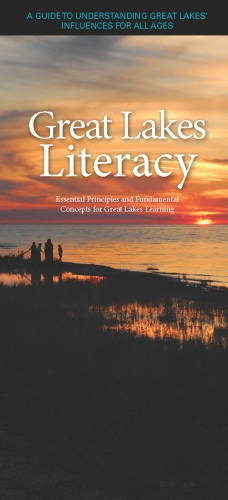The need for Great Lakes literacy
The absence of ocean and Great Lakes sciences in U.S. schools has resulted in a generation of Americans largely unaware of the importance of these invaluable resources. Given their importance and influence on our lives, we can and should do better.
This article is the first in a series of articles discussing what Great Lakes literacy means for residents of the state of Michigan and the Great Lakes region.
Great Lakes Literacy Principle One
The Ocean defines and dominates everything about our planet. It covers 71% of the Earth’s surface and is home to most of the life on Earth. The ocean regulates our weather and climate, provides the majority of our oxygen, and feeds much of the human population. Similarly, the Great Lakes dominate our state and region, represent approximately 21% of the Earth’s surface fresh water, and provide an unmatched freshwater shoreline longer than America’s East Coast. The Great Lakes influence our weather, support international commerce, provide an abundance of food, and offer excellent recreation and tourism destinations.
The enormity of the ocean and our Great Lakes has led many to believe that we need not be concerned about these waters. History is filled, however, with examples of how these vast resources can be very vulnerable to environmental stresses such as pollution, overharvesting, and invasive species. It seems obvious that understanding and being good and wise stewards of the Great Lakes is critical to the future of our region, so it is therefore difficult to understand how we got where we are today with respect to our knowledge (or the lack thereof) of the Great Lakes.
When the National Science Education Standards were published in 1996, they contained almost no mention of ocean, Great Lakes or aquatic sciences. As a result, none of the 50 U.S. states—each of which have their own science standards— included much about the ocean, Great Lakes or watersheds in their science standards. Because of this, concepts relating to the ocean and Great Lakes are infrequently taught in K-12 schools or found in curriculum materials, textbooks or assessments. How is it possible that in states like Michigan, New York, California, and Florida, concepts relating to the Great Lakes and our world ocean are not part of the education curriculum? The absence of ocean and Great Lakes sciences in schools has resulted in a generation of Americans largely unaware of their importance.
In recent years, there have been a number of efforts to define ocean and Great Lakes literacy. The Ocean Literacy Network, which includes the Great Lakes, has been working to identify and describe the science content and processes related to the ocean and Great Lakes. This will help define what should be included in all future science education at the local, state and national levels. An important breakthrough in this process was coming to a consensus about what it means for an adult to be ocean or Great Lakes literate. This led to identifying the essential principles that people need to know about the ocean in order to be ocean literate. Two documents – Ocean Literacy and Great Lakes Literacy Essential Principles and Fundamental Concepts – are being shared nationally as the basis for the essential principles for ocean and Great Lakes literacy. It is hoped that these Concepts will be used throughout the formal K-12 and university educational systems, as well as in informal and free choice learning settings. MSU Extension is leading the way in seeing that this happens in Michigan, and examples will be shared in subsequent related articles.
For more information about Great Lakes Literacy Essential Principles and Fundamental Concepts, visit the Great Lakes Literacy website and for more information about Ocean Literacy Essential Principles, visit the Ocean Literacy website.
(This article was adapted from Craig Strang’s “Preamble” from the 2004 online conference and the winter 2009 Current article based on his talk at IPMEN 2008 in Australia (Strang, C. (2009). Education for ocean literacy and sustainability: Learning from elders, listening to youth. Current: The Journal of Marine Education.)



 Print
Print Email
Email

